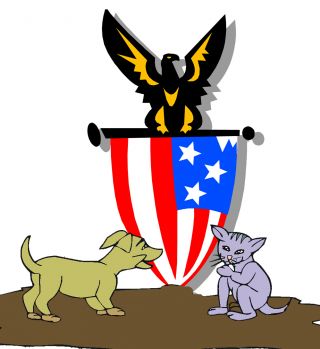Politics
Do Politics Matter When it Comes to Loving Cats or Dogs?
Liberals and conservatives have different feelings toward cats and dogs.
Posted June 25, 2013

While politics is always a matter which is likely to cause heated discussions, another question which is always guaranteed to stir up a hot debate is the issue of which pet people prefer, dogs or cats. One might think that because there are more pet cats than dogs in America that the issue is settled (see The Truth about Cats and Dogs — By the Numbers) but when it comes to which pet has captured our affection matters change quite a bit and surprisingly our political leanings may have an influence on our feelings toward cats and dogs.
A new survey has been released by U.S.-based Public Policy Polling group. Since 2001 Public Policy Polling has conducted surveys for politicians and political organizations, unions, consultants, and businesses. Now for the first time the Raleigh, N.C.-based company has conducted a poll on pets so it is not surprising that a political flavor crept into some of the questions in their survey of 603 registered voters.
This latest survey finds that six in 10 voters (61%) say they own a pet. Almost half (46%) say they spend between 1-5 hours per week taking care of their pets, while 25% spend between 6-10 hours, 7% 11-20 hours, 6% more than 20 hours and 16% less than one hour. One in five say they prefer to spend time with their pets over most human beings and almost a third (31%) say their pets sleep in the bed with them.
When it comes to emotional responses toward our pets there is a clear difference between dogs versus cats. While 52% of people say that they preferred dogs, only 21% chose cats (with the remaining 27% undecided). It is interesting to note that those people who classify themselves as liberals are more favorable to cats (27%) than their conservative compatriots (17%). Conversely the liberals, although still strongly favoring dogs over cats (49%) have a less pronounced bias than the conservatives where 57% prefer dogs.
When asked about their emotional responses to dogs and cats it is quite clear that dogs have captured our hearts to a greater degree. In general people have a much more favorable response to dogs since 81% of those surveyed say that they like or love dogs. What I found particularly remarkable was that even given the fact that there are more cats owned as pets in America only a bit more than half of the people surveyed (58%) say that they like or love them. It does appear from the data that those of the liberal persuasion tend to like all varieties of pets a bit more. Liberals who claim to like or love dogs total 86% as opposed to conservatives who, although still overwhelmingly loving canines do so a bit less at 77%. When it comes to the cats however, liberals seem to have much more affection for their feline companions at 69% as opposed to the conservative where less than half say that they like or love felines (44%). Conservatives are also a bit more likely to say that cat owners are weird (27%) than are liberals (20%).
One hint as to a possible reason for the difference in affection for dogs between liberals and conservatives may come from a question that looked at misbehavior on the part of dogs. That question asked of the dog owners "Does your dog or dogs bark and jump up on people every time they enter your house?" Apparently liberals are nearly twice as likely to have dogs that misbehave in this way (28%) as compared to their conservative countrymen (16%).
One final question of the sort which you might expect from an organization that normally does political polling, was "Based on their personalities, do you think a dog or a cat would make a better President of the United States?" Dogs clearly win this contest being chosen by 37% of the respondents compared to only 19% who choose cats. Just as in real elections there is a large undecided population of 45%. However, here the results are quite different when we break them down by political persuasion. Conservatives are unambiguous in their preference for a presidential animal with 48% favoring dogs and only 10% favoring cats. For liberals however it is a tossup, with cats actually favored slightly more than dogs at 28% versus 26%. While interesting I do not think that these results have implications for future presidential politics in the United States since I believe the Constitution requires that the president be at least 35 years of age — in human years — which I believe eliminates both felines and canines from running for this high office.
Stanley Coren is the author of many books including: Born to Bark; Do Dogs Dream? The Modern Dog; Why Do Dogs Have Wet Noses? The Pawprints of History; How Dogs Think; How To Speak Dog; Why We Love the Dogs We Do; What Do Dogs Know? The Intelligence of Dogs; Why Does My Dog Act That Way? Understanding Dogs for Dummies; Sleep Thieves; The Left-hander Syndrome
Copyright SC Psychological Enterprises Ltd. May not be reprinted or reposted without permission


